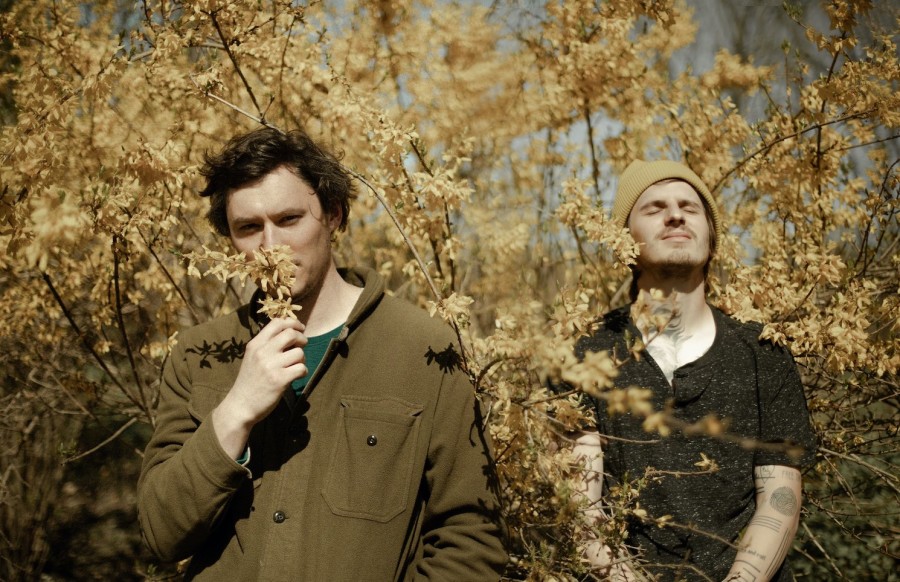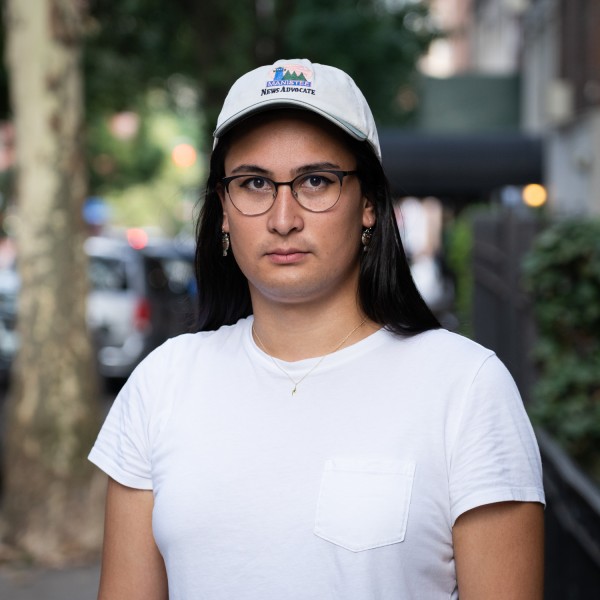Q&A: Time, place and live music with The Front Bottoms’ Brian Sella
The frontman of the New Jersey-born punk rock band spoke with WSN about the evolution of the band’s style and returning to perform in his home state.
The Front Bottoms’ guitarist and vocalist Brian Sella and Mat Uychich. (Photo by Mark Jaworski, courtesy of Sydney Worden)
May 5, 2022
“Everyone blooms in their own time,” promises the first track on The Front Bottoms’ 2020 album “In Sickness & In Flames.” With the pandemic putting live music on a long pause, people’s patience was certainly tested.
This May, the band is returning to live indoor performances with a series of concerts in Jersey City.
Guitarist and vocalist Brian Sella and Mat Uychich have been a mainstay of alternative music since The Front Bottoms’ 2011 self-titled debut album. They’ve mastered pathos-forward songwriting that tackles messy relationships and unashamedly flawed characters in tracks like 2013’s iconic “Twin Size Mattress.” They traverse the New Jersey music scene from folk-punk to pop punk to whatever punk-rock-pop-influenced thing they’re doing these days (“rock… punk… alternative? I don’t know,” Sella said).
2020’s “In Sickness & In Flames” was released during the height of the COVID-19 pandemic without a proper tour. Though they’ve done a few outdoor shows in recent years, the upcoming White Eagle Hall concerts will be a homecoming for the band.
Sella sat down to talk with WSN ahead of The Front Bottoms’ three-day residency at White Eagle Hall in Jersey City, New Jersey, from May 18-20.
This interview has been edited for length and clarity.
WSN: Along with genre, I’m wondering how the band’s instrumentation as a whole has kind of shifted over time. I’m a trumpet player myself, so I really love the horn sections in some of the older albums. But “In Sickness & In Flames” doesn’t really have any horns — it goes in a different direction. You talked about the acoustic guitar — what are some ways that your instrumentation has shifted over time to match the band’s vision?
Brian Sella: I think having the access to equipment — nice equipment, beautiful studios and big-time producers and stuff like that — it changes the way that you approach the theory of making a song, you know? Because back in the day, I would sit in my room with an acoustic guitar, and Mat would, like, play on a bucket, and that was totally satisfying. And then it was like, “Oh, we found somebody who played trumpet.” And that was, you know, a good vibe, so they played trumpet. And then we found somebody who played the bass. I realized a lot of our early songs that are out on the internet that people listen to — there’s no bass, nobody played the bass or anything.
We were definitely just like, “Oh, this feels good, and this is right, and we could put it on the internet tonight!” That’s kind of how our band has always developed, not just with instrumentation, but also with aesthetic and energy and all that stuff — style. It’s just sort of been like, “Oh, we have this now. Okay, let’s do this.” And kind of just following what feels right and following our gut and making the next part of the song based on the part of the song before.
WSN: That’s something I’ve noticed lyrically as well. There’s a lot of songs, especially in your older albums, that started off in one direction and ended somewhere completely different, and it feels natural the whole time.
BS: I basically have realized that my process has a lot to do with free writing, and the process of writing, like, physically, with my hand holding a pencil and writing in a notebook. And because I’m a slow writer, I have time to think in between the words as I’m writing them. It changes what I’m saying. And I’m able to think about each word, which is why it’s very hard to understand my writing because I’m skipping words, and the spelling is all crazy, but it’s just something about feeling the natural writing process.
And with that free writing energy — doing it as a meditation and sitting down and doing it for a few hours a day, just kind of free writing. And then going back eventually and reading through when I come up with a cool guitar riff and I need some lyrics, and realizing that a lot of things do connect.
If it’s at a certain time in my life, the topics will all basically be about one particular thing and everything will come together as a story, kind of naturally. And that’s where the lyrics sort of come from — it’s like stories.
WSN: How has that changed over the course of your career? Because the song structures on your most recent album, for example, are way different than the self-titled.
BS: Totally. It’s kind of about fitting lyrics into a show. I’m recognizing the other instruments more in the fact that it’s a song, a band, while the stuff on self-titled was me sitting in my room, just letting the words make the melody.
There’s a good mix of that, and the technique changes, and it could always go back and forth. I’ve been writing a lot more poetry, and I’m realizing the verses are getting a lot longer and letting the words make the melody.
During the pandemic, I had the time to think about things and figure out what my particular techniques were as a songwriter and what I would kind of rely on. I’m still trying to figure it out, you know, but it does have a lot to do with going back and listening. Maybe I’m just coming at it from a different perspective — still with the same talent — but just a different perspective.
WSN: The pandemic has sort of separated you from how you used to do music — I mean, live shows have been a really important part of this band’s identity. What’s it been like being separated physically for most of the pandemic, with a couple exceptions, and then coming back to this residency in Jersey City?
BS: It’s very exciting; I feel very lucky and honored. I mean, it was very tough. I definitely realized during the pandemic — I’m an entertainer, you know, I was born to entertain.
You go through the struggle on tour, and you’re like, “Oh, man, I want to go home,” or you get a little homesick. But being home with no option of leaving — you realize how lucky you had it, and also how important that was to your mental health to be able to feel like there’s a purpose in your life.
We were also extremely lucky too, though, because we got to play a bunch of outdoor shows. I’m speaking from an interesting perspective, where we did play maybe four outdoor shows. So even with that weird scenario, we got to have some pretty interesting experiences and very cool experiences. So this Jersey City residency is just kind of like another one of those freaky, lucky experiences that I’m just going to try to have fun and make sure everybody has fun, get good openers, you know, make a three-day event out of it.
WSN: You’re returning to your home state where you came up.
BS: One hundred percent.
WSN: Can you talk about what it was like coming up in New Jersey and what that scene was like?
BS: I grew up living the suburb life for sure. And it wasn’t until basically during college that me and Mat were making songs or recording songs and stuff. When I got out of college, he had just got out of high school, or maybe a year out of high school. And it was like, “Alright, let’s try to make some songs” — which we had a bunch of — “and go on tour,” and that was basically it. That was how we got going. We would find, like, Maxwell’s in Hoboken — that was like a big spot that we were like, “Oh, we gotta play Maxwell’s!” That was a goal. And then we would book and play it, and then places down in Asbury Park, like the Lanes or any of those historic places like Starland… It was all about like, how do we play that show or find a band or any cool DIY venue?
Jersey gave us the opportunity to be close to New York and close to Philly, close to Richmond, close to New England. That was a big one — we could go up there during the winter and play, you know, living rooms, and stuff like that. New Jersey offered that for us. Me and Mat lived in Jersey City for a really long time and made a bunch of friends and got a bunch of inspiration just from that city life.
WSN: A lot of bands try to go bigger — have you ever thought about going smaller and playing some undersells, going back to some smaller shows?
BS: Hell yeah. I want to just keep it creative.
There’s a really creepy cemetery in Jersey City. And they do punk shows, like Halloween shows, and it’s just awesome. That would be a show that I would definitely want to play in the future. At the cemetery, and just any type of cool thing.
There’s a lot of fun venues that me and Mat played when we were coming up in Jersey City, but I am interested in doing a more acoustic vibe, a little softer-type shows, for sure. But all in good time.
WSN: In addition to the band having a strong sense of place throughout its career, there’s also been a really strong sense of place in your songs and albums, like beach towns or growing up in the suburbs. How was that sense of place — like where you were at the time — reflected in the music itself?
BS: I definitely am a pretty literal lyricist. I’m looking around and being like, “Okay, I’m at the beach.” Certain places have more of an effect. Water is a big thing — any type of body of water. I always kind of come back to that. I think that my environment just has an effect on what I’m writing about.
WSN: What are you excited for about returning to New Jersey, playing White Eagle, playing live again with a full band?
BS: I’m excited about all that. I’m excited that we’re going to have other musicians on stage. Just playing live is such a good feeling to have as a human being. It’s unbelievable — to be in a room with people all singing the words. It’s, you know, it’s incredible. You said you went to the Pier 17 show? Even when I went up the stairs to go on stage, I was just like, “Holy shit! Even the price of the ticket and getting to stand on this roof right now is, like, totally worth it.” Just getting to come up here and see the bridge and the skyline and stuff.
Getting to have experiences like that moving forward is definitely what I’m excited about. And keeping it fresh and putting out new music and entertaining the people.
The Front Bottoms will perform at White Eagle Hall in Jersey City, New Jersey, on May 18, 19 and 20. Their music is available to stream on all platforms.
Contact Alex Tey at [email protected].

























































































































































